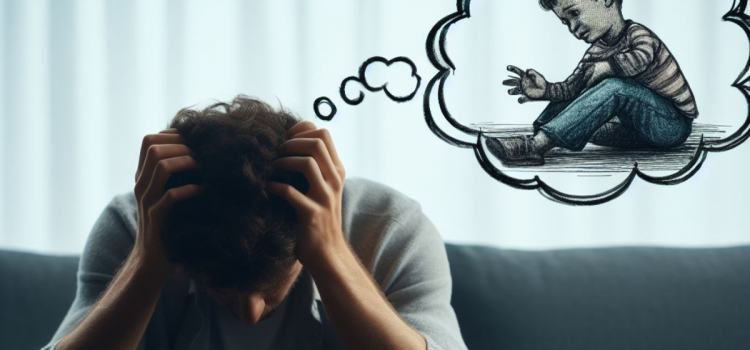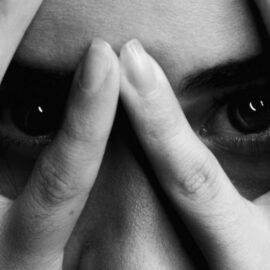

This article is an excerpt from the Shortform book guide to "King, Warrior, Magician, Lover" by Douglas Gillette and Robert L. Moore. Shortform has the world's best summaries and analyses of books you should be reading.
Like this article? Sign up for a free trial here.
What’s the origin of toxic masculinity? Why are so many men so psychologically unhealthy?
The origin of toxic masculinity can be traced back to a loss of father figures, a lack of ritual initiation into manhood, and the effects of patriarchy. Patriarchy is harmful to men in that it forces repression of the feminine in that it equates unhealthy ideals with masculinity.
Keep reading for more on ideals of masculinity and why men are struggling to find a healthy mindset.
Healthy Masculinity in Decline
Western society (meaning the US and Western Europe) is suffering from the decline of healthy, mature masculinity. It’s being replaced with various forms of immature and abusive masculinity. This unhealthy masculinity takes various forms: It can be seen in weak and passive men, but also in the fact that modern society is run largely by angry, violent, domineering men. The origin of toxic masculinity comes down to three contributing factors:
1) The loss of the traditional family unit; boys growing up without fathers. More boys are growing up in fatherless homes, which deprives them of a crucial male role model.
(Shortform note: According to a study by the Pew Research Center, 22% of US children were living with single mothers in 1997, up from 12% in 1968. However, that same study shows that the trend didn’t continue: In 2017, the percentage of children in fatherless households was actually slightly lower at 21%.)
2) The loss of rituals and initiations into manhood. As society has become more intellectual, it’s lost important coming-of-age rituals that initiate boys into adulthood. Even the practices that people still uphold have lost much of their impact; people now see them as mere ceremonies, instead of as meaningful rituals. For example, a Jewish bar mitzvah is supposed to be a life-changing ritual wherein a boy is officially recognized as a man by his congregation. However, today a bar mitzvah is just a special service that happens when a Jewish boy turns 13—he doesn’t take on the rights and responsibilities of an adult congregant once it’s over.
(Shortform note: According to some experts, coming of age rituals can be valuable in numerous ways, both to individuals and to society as a whole. For an individual, such rituals draw a clear distinction between childhood and adulthood, which helps them to form their identity; the rituals let children know when it’s time to start behaving like adults and help prepare them to do so. For society, coming of age rituals ensure that cultural values and practices are passed on to the next generation. To continue the previous example, bar mitzvahs require Jewish boys to read from the Torah (the Jewish holy scripture), and take a major role in one service at their temple.)
3) Equating masculinity with patriarchy. More people are becoming aware of what feminists have termed the patriarchy: the fact that Western society is largely controlled by cruel and degrading forms of masculinity. However, modern culture is overcorrecting to the point that it now labels all masculinity as harmful. Because of that overly broad label, boys are becoming nervous about exploring and expressing their gender.
(Shortform note: Both patriarchy and overcorrection cause people to repress important parts of their identities. Carl Jung taught that every man has subconscious feminine traits (which he called Anima), and every woman has subconscious masculine traits (Animus). This means that everyone has masculine and feminine tendencies—for example, many women love to play sports, even though competition is usually associated with masculinity. However, patriarchy teaches that all femininity is weak and shameful, which makes boys afraid to show supposedly “feminine” traits such as kindness. This is just as harmful to their development as teaching that all masculinity is toxic and abusive.)
In short, boys can no longer rely on their families, tribes, or societies to initiate them into adulthood. As a result, countless men are psychologically still trapped in childhood, simply because they never learned how to think and behave like grown men.
However, it’s still possible for these men to connect with a strong, loving, and nurturing form of masculinity; the work of Swiss psychiatrist Carl Jung explains how. Jungian psychology teaches that there are four aspects of a man’s personality that, working together, create healthy and mature masculinity: the King, the Warrior, the Magician, and the Lover. Every man has the potential to embody all of these masculine ideals.
(Shortform note: King, Warrior, Magician, and Lover are only four out of the 12 archetypes that Jung identified. However, Jung’s 12 archetypes describe all people, regardless of their age or gender. The discrepancy is because we are focusing on the four that are most important for adult men specifically.)

———End of Preview———
Like what you just read? Read the rest of the world's best book summary and analysis of Douglas Gillette and Robert L. Moore's "King, Warrior, Magician, Lover" at Shortform.
Here's what you'll find in our full King, Warrior, Magician, Lover summary:
- Why modern men struggle more with their masculinity than previous generations did
- How a lack of healthy masculinity hurts society
- The two foundational requirements for healthy masculinity






